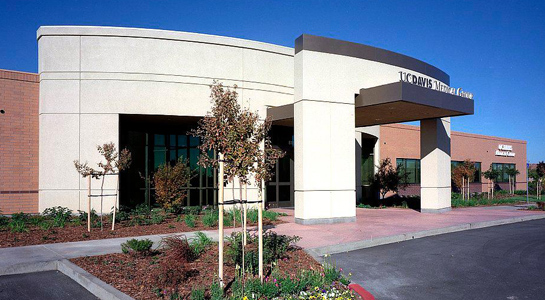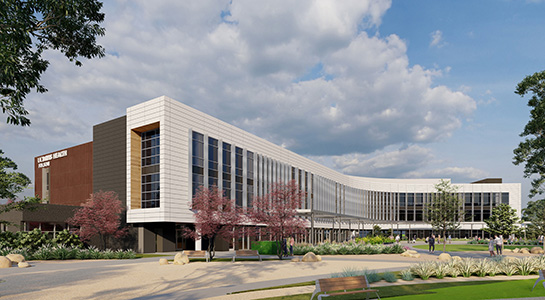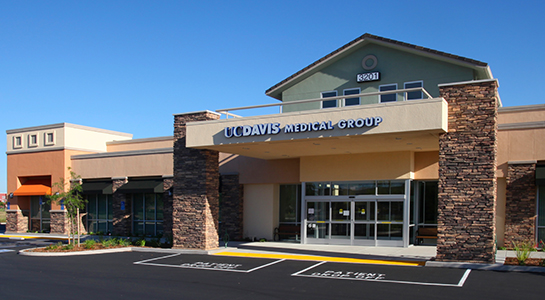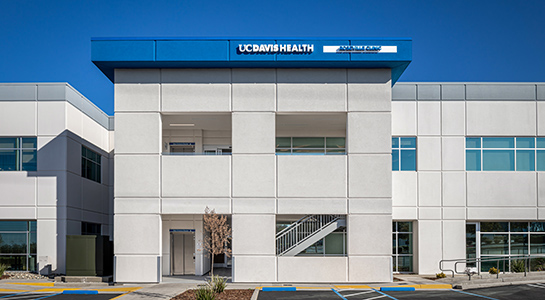Type 1 Diabetes
Our specialists help you live well with type 1 diabetes. We provide everything you need, from advanced insulin therapy to nutritional counseling.
Medically reviewed by Deborah Plante, M.D. on Nov. 28, 2023.

What Is Type 1 Diabetes?
If you have type 1 diabetes, your pancreas makes little or no insulin. Your pancreas is part of your body’s endocrine system, which produces your hormones.
Insulin is a hormone that moves glucose (sugar) from your blood to your body’s cells. In your cells, your body can use it for energy and other body functions.
Without insulin, glucose stays in your blood, causing your blood glucose levels to get too high. In addition, your organs don’t get the glucose they need. Over time, high blood glucose levels can lead to health problems and organ damage.
Specialists at UC Davis Health have expertise in the latest and most effective treatments for type 1 diabetes. We use our knowledge and experience to help you live a healthy life.
Symptoms of Type 1 Diabetes
Symptoms of type 1 diabetes can come on quickly. Here are some common type 1 diabetes symptoms and other symptoms that can be an emergency.
Common Symptoms
You might notice these symptoms in the early stages of type 1 diabetes:
- Blurry vision
- Fatigue
- Increased hunger
- Increased thirst
- Urinating more than usual
- Weight loss without an obvious cause
Emergency Symptoms
Type 1 diabetes can cause diabetic ketoacidosis (DKA), a life-threatening emergency. Seek immediate medical care if you notice these signs:
- Being very tired without an obvious cause
- Confusion or inability to think normally
- Dry skin and mouth
- Flushed (red) face
- Fruity-smelling breath
- Muscle stiffness or pain
- Nausea or vomiting
- Stomach pain
Causes of Type 1 Diabetes
Type 1 diabetes is an autoimmune disease where antibodies attack the cells that make insulin (beta cells). This causes insulin deficiency. Researchers are still studying the causes of type 1 diabetes. Usually, type 1 diabetes occurs in children or young adults, but it can also appear later in life.
The causes of type 1 diabetes are different from type 2 diabetes. Only about 5% of people with diabetes have type 1.
Autoimmune Reaction
An autoimmune reaction happens when your immune system mistakenly attacks healthy cells. With type 1 diabetes, your immune system may destroy the insulin-producing cells in your pancreas.
Genetics and Environment
A combination of genes (inherited traits) and environment may cause type 1 diabetes in some people. Environmental factors could be exposure to viruses or pollution.
Diagnosing Type 1 Diabetes
If your provider thinks you could have type 1 diabetes, they will usually order a random plasma glucose (RPG) test. An RPG is a blood test that measures how high your blood sugar is. A high RPG can mean you have type 1 or type 2 diabetes.
Your provider may also test your blood for certain autoantibodies, which occur in people with type 1 diabetes – not type 2. Autoantibodies are immune system proteins that fight against your own cells and tissues. These blood test results can point to type 1 diabetes.
Our specialists have decades of experience diagnosing type 1 diabetes, so you receive accurate results. If you do have the condition, we take immediate steps to get you the care you need.
Type 1 Diabetes Treatments at UC Davis Health
At UC Davis Health, you can be confident you’ll receive the highest quality care for type 1 diabetes. We are ranked among the top programs in the nation for diabetes and endocrinology.
You also benefit from our team approach to diabetes diagnosis and treatment. Our internal medicine physicians and endocrinologists (endocrine system specialists) partner with certified diabetes educators, social workers and mental health providers to deliver comprehensive care.
Many of our physicians are deeply involved with type 1 diabetes research and clinical trials. Through this research, we are learning more about this disease — and using this knowledge to move diagnosis and treatment forward. As our patient, you have access to the newest medical discoveries before they are widely available.
Blood Sugar Checks
We offer the newest continuous glucose monitors (CGMs), which don’t require finger sticks. Our staff shows you how to check your blood sugar and teaches you about your ideal blood sugar range.
Education and Support
Our certified diabetes educators offer diabetes classes and support groups. We empower you to live your healthiest life and help you connect with others who understand your challenges and successes.
Insulin Therapy
All people with type 1 diabetes need insulin. There are different ways to get the insulin, depending on your needs. This includes injections (shots), inhaled insulin or an automated delivery system that releases insulin throughout the day. Our team helps you choose the type of insulin that is best for you.
Nutritional Guidance
Our registered dietitians work with you to create a diet plan that suits your preferences. We answer your questions and help educate you on how to count carbohydrates and match insulin.
"National Diabetes Statistics Report," Centers for Disease Control and Prevention (CDC), https://www.cdc.gov/diabetes/data/statistics-report/diagnosed-diabetes.html
Who does it affect?
1MU.S. adults have type 1 diabetes
Type 1 diabetes affects
244KU.S. children and adolescents
Sources: Centers for Disease Control and Prevention (CDC): Prevalence of Diagnosed Diabetes
American Diabetes Association: Statistics About Diabetes
Request an Appointment
As Sacramento's No. 1 hospital, you'll benefit from unique advantages in primary care and specialty care. This includes prevention, diagnosis and treatment options from experts in 150 specialties.
Referring Physicians
To refer a patient, submit an electronic referral form or call.
800-4-UCDAVIS
Patients
Call to make an appointment.
Consumer Resource Center
800-2-UCDAVIS
We offer diabetes diagnosis and treatment at four of our clinics throughout the Sacramento region.
-

Elk Grove
See more clinic informationarrow_forwardlocation_on 8110 Laguna Blvd., Elk Grove, CA 95758
call 916-683-3955
-

Folsom
See more clinic informationarrow_forwardlocation_on 14264 Innovation Drive, Folsom, CA 95630
call 916-946-1700
-

Rancho Cordova
See more clinic informationarrow_forwardlocation_on 3201 Data Drive, Rancho Cordova, CA 95670
call 916-851-1440
-

Roseville
See more clinic informationarrow_forwardlocation_on 1620 E. Roseville Pkwy., Roseville, CA 95661
call 916‑783‑7109

Ranked among the nation’s best hospitals
A U.S. News & World Report best hospital in cardiology, heart & vascular surgery, diabetes & endocrinology, ENT, geriatrics, neurology & neurosurgery, and pulmonology & lung surgery.

Ranked among the nation’s best children’s hospitals
U.S. News & World Report ranked UC Davis Children’s Hospital among the best in pediatric nephrology, orthopedics*, and pulmonology & lung surgery. (*Together with Shriners Children’s Northern California)

Ranked Sacramento’s #1 hospital
Ranked Sacramento’s #1 hospital by U.S. News, and high-performing in aortic valve surgery, back surgery (spinal fusion), COPD, colon cancer surgery, diabetes, gynecological cancer surgery, heart arrhythmia, heart failure, kidney failure, leukemia, lymphoma & myeloma, lung cancer surgery, pacemaker implantation, pneumonia, prostate cancer surgery, stroke, TAVR, cancer, orthopedics, gastroenterology & GI surgery, and urology.

The nation’s highest nursing honor
UC Davis Medical Center has received Magnet® recognition, the nation’s highest honor for nursing excellence.

World-class cancer care
One of ~59 U.S. cancer centers designated “comprehensive” by the National Cancer Institute.

A leader in health care equality
For the 13th consecutive year, UC Davis Medical Center has been recognized as an LGBTQ+ Healthcare Equality Leader by the educational arm of America’s largest civil rights organization.

